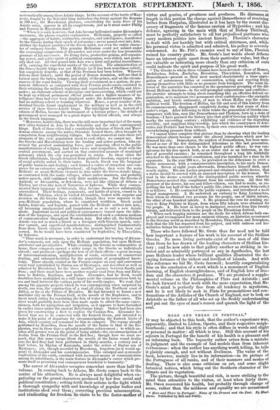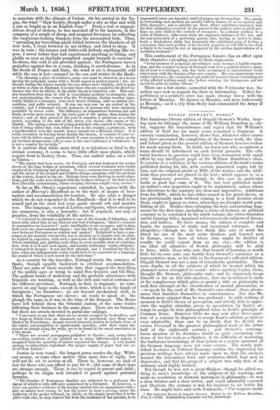HERE AND THERE IN PORTUGAL..
IT may be objected to this book, that the author's experience was, apparently, limited to Lisbon, Oporto, and their respective neigh- bourhoods; and that his style is often diffuse in words and slight or personal in matter: all which is true. Still this account of his sojourn in Portugal for the benefit of his health is a pleasant and an informing book. The loquacity rather arises from a mistake in judgment and the example of bad models than from inherent verboseness: when the author has anything worth telling, he tells it plainly enough, and not without liveliness. The value of the book, however, mainly lies in its information—in its picture of the Portuguese of all ranks, and of their manners and modes of dealing. There is also some criticism on art, and some slight botanical notices, which bring out the Southern character of the climate and its vegetation.
• The picture though beautiful and rich, is more striking to the mind than attractive to the visitor, at least when fairly there. Mr. Owen recovered his health, but probably through change of scene, rather than the mildness and equality we are accustomed
• Here and There in Portugal : Notes of the Present and the Past. By Hofit. Oven. Published bx Bell and Daldy. to associate with the climate of Lisbon. On his arrival in the Ta- gus, the wind "blew keenly, though under a sky as blue and with a sun as bright as in an English June." From a real or supposi- titious dread of cholera, he was marched off to the lazareto, in the company. of a couSfm sheep, and prepared for repose by collecting
the suspicious-loo blankets from the unoccupied beds. Then,
" spring ray tray -plaid folded between the blankets of all four beds, I crept between in my clothes, and tried to sleep. It was in vain ; the intense and bitter cold forbade anything like re- pose. I never before that had experienced anything so biting, and gladly as soon as daylight permitted sought warmth in exercise." In-doors, this cold is not provided against: the Portuguese have a prejudice against fire in a room, thinkilig it unwholesome. As in the South of France and Italy, the wind or air is frequently cold while the sun is hot—summer in the sun and winter in the shade.
"In choosing a place of residence, some care must be observed, as a house having the principal rooms with a North aspect is perfect misery ; for, al- though during the whiter months the sun shines more brightly, and is quite as warm as June in England, it is only those who are exposed to its direct in- fluence who feel its effects ; in the shade the air is intensely cold. This sud- den transition from heat to cold is exceedingly perilous to strangers, who, not understanding the reason why the Portuguese during weather appa- rently bright to a stranger, wear such heavy clothing, take no similar pre- cautions, and suffer severely. It was my own case on my arrival in the country, and I witnessed several instances of persons who were similarly punished by severe colds. The difference in temperature between sun and shade, is even more severe in the early part of the spring than during the winter ; and at that period of the year it requires a greatcoat or a cotton jacket, according. to the side of the street you choose—the sunny or the shaded. The spring costume of young gentlemen who aspired to the reputa- tion of being rather fast, was, when I was in the country, a greatcoat, with a handkerchief over the mouth, heavy enough for a Russian winter. It is really necessary on leaving home during this season, to consider if your re- turn will be before sunset, particularly if your excursion is by water, as the air becomes dangerously cold so soon as the sun's influence is withdrawn : it is not a country for invalids."
It is curious that while mere wind is so injurious or fatal to the animal economy, it seems to have little effect upon plants, which require frost to destroy them. Thus, our author notes on a visit to Cadre-
" The winter had been severe, 'for Portugal, and had destroyed the tender shoots of the long hedges of geranium, which several workmen were busily employed in trimming and pruning. It was a common rose-scented variety, and the odour of the bruised and trodden foliage, mingling. with the perfume of the violets, floated in the air. Delicate ferns were thriving in moist situa- tions, and the rocks were fringed with the feathery foliage of the hare's-foot fern (Davallia. iarnmiensis), whose creeping rhizoma sought every crevice:, So far as Mi. Owen's experience extended, he agrees with the author of Murray's Handbook as to the want of means of loco- motion and accommodation for tourists. He also adds a danger which we do not remember in the Handbook—that it is well to be armed and on-the alert lest your guide should rob and murder you. The language except at Lisbon and Oportd, where strangers are- numerous; is also a necessity; but if acquired, not easy of practice, from the volubility of the natives. "I Ventured to attempt a question to one of the Guards d'Alfandiga, and innocently asked him in my choicest and best Portuguese, Qual d o numero de passageiros no Lazareto ? ' quite intelligible to me on paper, and to him, from even my unaccustomed tongue' but alas for the result, and the differ- ence between Portuguese as written and spoken ! Delighted to have a pas- senger to his sanitary retreat who was so anxious as to inquire into its state, he replied in eagerness' with such a paroxysm of the alphabet in fits, all the letters tumbling and jostling each other in every possible state of combina- tion from A to Z and back again, and hastily muttering muito obrigado,' I retreated in despair: it was my first attempt, and I trembled for the fu- ture, when my indispensable wants would have to be expressed in a language the sound of which I now heard for the first time."
As a country for the traveller, Portugal wants the romance of Spain, though equally backward in civilized accommodation. There are none of those wayside inns that suggest the travelling of the middle ages or bring to mind Don Quixote and Gil Bias. The gallant bands of muleteers and the probable adventures with brigands are wanting, as well as the rich and varied costumes of the different provinces. Portugal, in fact, is stagnant: no com- merce on any large scale, except in wine, which is in the hands of foreigners; no literature ; no art beyond. mechanical skill, in which the Portuguese are clever ; no roads to speak of; the plough the same as it was in the time of the Romans. The Moors have left behind them the Oriental custom of the same trades following their business in the same place. There are no bazaars, but there are streets devoted to particular callings.
"I am sorry to say that there are no streets occupied by booksellers, and few shops at which even an almanack .can be purchased., save those esta- blished by Frenchmen though several itinerant dealers in ballads, lives of the saints, and pamphlets of questionable morality, with their wares dis- played on strings along the wale, are to be found in the usual association in
a bye street. * * * * " There are several newspapers published in OpOrto ; • and, seeing three succeeding numbers of one printed on as many different-sized papers, I imagined that, the quantity of matter regulated the change. A very quaint apology to subscribers explained—the proper supply of paper had not ar- rived from Lisbon."
Justice is very venal: the longest purse carries the day. With- out money, or some other motive than mere love of right, law will not be set in motion at all. There is however, no lack of law for those who can afford to pay for it ; 'did some of their laws are strange enough. There is one in regard to parent and child; perhaps in its origin well intended to guard. against parenta tyramiy. "The females of Portuguese families are subjected to a seclusion the rigour of which is with difficulty understood by a foreigner. If, however, a lover can produce evidence of his having entered into an engagement with a OH, no matter how young, he has the power to issue a process, under the authority of the proper tribunal, by which, on the simple proof that it is the girl's wish also, he may remove her from the residence of her parents, to be ittspoondeel (eater em deposito) until of proper age for marriage. The agents in forwarding such matters are usually elderly dames, of no occupation and little &meter ;. and so adroitly are these affairs sometimes managed, that the first intimation received by the parent is the judge's order to yield per- haps an only child to the custody of strangers; in a similar position to a ward of Chancery, alike away from the supposed vigilance of the law, and the real protection of a sorrowing parent, who, having no power to disin- herit a disobedient child, has frequently the additional pang of feeling a conviction that such portion of his divided property as will fall to his child is likely to be wasted in riot or dissipated by the careless improvidence of a worthless husband."
This confinement of the Portuguese females has an effect upon their character extending even to their expression.
"Consciousness of perpetual surveillance soon becomes a legible expres- sion, and the younger women of Portugal wear it to a painful degree—pain- ful at least to a stranger' who has been accustomed to unrestrained social intercourse with the females of his own country. My own impressions were rather ludicrous ; the constrained and artificial manner always reminding me of the affected waiting-maid, who before entering the diningroom put her mouth in prim by saying bEsom.' " There are a few stories connected with the Peninsular war, the author says new as regards the facts or information. Either for- getfulness or a printer's error has made strange havoc with the letters of Massone. He figures as Messina, and more ludicrously as Messina,—as if a city from Sicily had commanded the Army of Portugal.



































 Previous page
Previous page